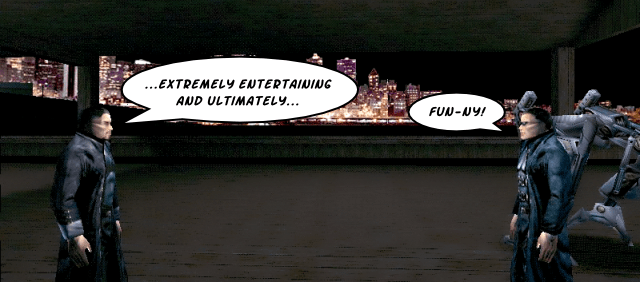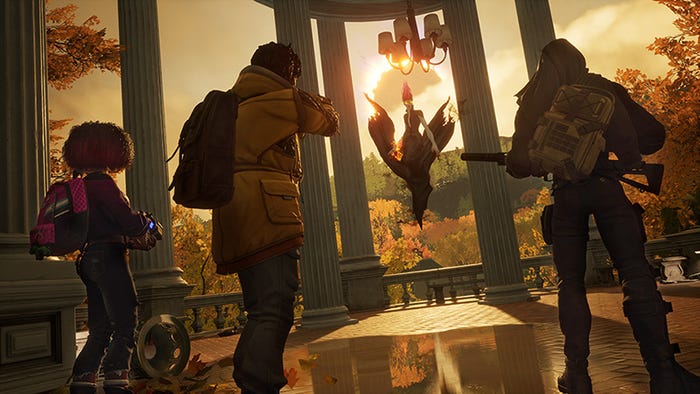Retrospective: Deus Ex, Part 6
The last part 6 of a Deus Ex retrospective just in time for the release of Human Revolution. Well, in some parts of the world... 25th for others.

Is It Really All About Story?
I’m not going to go into player motivation here, that was covered already in part 3. Nor am I going to talk about story as in mission design, as that’s been covered all over, but largely in part 2 and part 3. What I want to cover here, to highlight here, is I guess would be referred to as “atmosphere;” an aspect of storytelling and world creation that creates player immersion into the game world.
Great atmosphere, that’s unique or in some way poignant in timing – an sci-fi RPG mix like Deus Ex, I think was a long time coming. Can actually make up for other areas of a game that are lacking, such as in actual story and gameplay. Make it appear that the game has more of these two than it actually possess. As an example, a very art-driven (and developed) game, that is often said to be story-driven, usually by artists. Is Bioshock (2007). A game that I think is not that intelligent story-wise, more by chance than by plan, fostered by a strong atmosphere – mix of visual aesthetic and premise – that sparked player’s imaginations. Making them see things in the game, that weren’t actually present.
An example being the AI, which was talked about as being something extraordinary. It’s actually quite basic. Monster hears or sees you – or seems to sense your presence regardless – and then proceeds to charge directly at you so as to attack. It didn’t strike me as appearing very “intelligent,” yet gamers and reviewers were adamant that it was one of the best they’d played against; it seemed to me that Bioshock’s gameplay, was pretty much the standard arcade-shooter affair. I think the atmosphere played a large part in creating this particular illusion, and helped carry the various weaknesses of the game – which became far more apparent when some of these same gamers and reviewers played the sequel, after some of the charm and effect from the atmosphere set in the first game, had lost some of it’s initial impact and novelty.
The novelty of the concept, the visual style and how that helps create a unique atmosphere, really helped Bioshock be what it was. Unfortunately, it was not recognised for this, but rather, other weak arguments like AI were used as to why the game had become a success – though I’m sure, being hyped as the “spiritual” successor to System Shock (1994), also helped a bit; honestly, play Dead Space (2008) if you haven’t, as it is more of a successor to the System Shock series than Bioshock ever was. However, not all games can do the same just with “atmosphere” without more in the way of a stronger storyline, to drive the gameplay onwards.
A good story, with the effective use of atmosphere, can do wonders when your gameplay isn’t quite what it’s been made out to be. Case in point: Deus Ex.
As some have made quite clear in their opinions of the title, the story isn’t exactly going to get an Oscar nomination for screenwriting or a Philip K Dick award for science fiction writing. It was good enough, interesting enough, with enough well used themes and story mechanics and art direction for the atmosphere to be original enough in drawing the player in and immerse them into the Deus Ex universe. Make the player see more to the gameplay than actually existed to begin with.
Story comes to the forefront in this, as the quality of the writing, and the voice acting and the like, will determine whether your Saturday morning cartoon game will only appeal to youngsters, or adults alike. Good example of this, is The Incredibles (2004) – or even WALL-E (2008); which I might add, has quite A LOT of spoken dialogue. The movie can be enjoyed by young and old alike. The kids will get the visual gags, and the adults, will get the social commentary gags in way of dialogue and performance. Something that many game developers still don’t seem to appreciate, when they make their E for Everyone low quality trite.
That said, sometimes, things are just meant to be appreciated by adults or those with the maturity to do so (MA 15+). And sometimes, just by the young, or those young at heart. But you have to honestly ask yourself which of these your title is trying to appeal to, and honestly, appraise your title’s writing and ability to craft and engaging atmosphere to hold your target (market) player’s interest and attention.
If you don’t, you could end up with something that has a lot in way of style (atmosphere), but very little in way of substance (story). Of course, none of that will matter much if it hasn’t got gameplay, as games are an active medium, not passive one like film.
And with a Deus Ex title, your going to have to at least appeal to the adults. Deus Ex has always been aimed at a mature audience, but, the original title came out a decade ago. Those that remember it, are now adults.
The Style and Substance of Storytelling
Regardless of the dialogue writing and acting, an important aspect to a Deus Ex title in creating engaging and “believable” atmosphere, are its (story) themes.
All science fiction, especially good science fiction, is a social commentary on society seen through the lens of technology – this being a symbol of the unnatural effect of man on nature and humanity alike. But really, this technology, is just a ploy if you will, as it is still socially based. It’s used as a means to create a method of scrutinizing an aspect of society. Create a “what if” situation, so that human behaviour can be examined as a basis for telling a story. And at their hearts, they’re still your traditional types of story. As a good science fiction story, at the heart of it could be a thriller (Bladerunner, 1982), adventure (The fifth Element, 1997) or even a love story (Monsters, 2010).
But all good sci-fi has one thing in common. It makes you think, in that it poses various questions (themes) to the audience – apartheid and race (District 9, 2009) for example, or asks when an introduced species into an ecosystem ceases to be “alien” and starts being considered a “native” (Monsters). It has a social commentary that plays upon the themes of the day, and makes you question where we as a society are heading towards and if we are brave enough to embrace it.
It turns the lens into a mirror that is reflected back at our selves to show us our own very natures in a way that we may not have appreciated otherwise.
I guess you could also liken it a bit to Tron (1982) and Tron Legacy (2010), in that Tron had a social commentary, even if it wasn’t at all clear yet what that was, or, even if it didn’t quite paint the right picture – the effect and importance of computing, and games as the driver of this, on the world; not just the power of corporations and the abuse of computing to this end in controlling the populace (or at least that’s my hazy take). Tron Legacy, seems to have missed an opportunity to do so, in that social commentary that could have been present, was one on privacy and identity within the prevading digital world, and who owns this diaspora of digital information.
Think about it, Jeff Bridges character, Kevin Flynn, also has a digital counter-part, Clu. The digital counter part has his identity, his personality and even his memories to a degree. When you think about how much in the way of time we spend online, the trail of information and nuggets of personality that we leave all over the place. Well, perhaps the movie could have posed the following question:
What would happen when through the progression of technology, all this data coalesces into a digital persona, that is capable of thinking for its self and making it’s own moral decisions? Who ends up “owning” this identity that you for so long have taken as a given as being your own?
Other threads could have explored identity theft – Clu and everybody else, is rather eager on getting their hands on Flynn’s identity disk, after all – and perhaps Flynn’s company, ENCOM. I can’t help but feel that an element of the privacy and identity thread, could have also had an aspect to do with how corporations (Google and Facebook) make use of these two elements in way of their customers, rather than, a small and rather maligned subplot commentary to do with Microsoft operating systems and “open-source.”
It ends up feeling out of sync with the direction of the world we’re in, it seems to struggle with that and in creating a believable world due to this. Perhaps also, since the “game” aspect of the sequel is never really mentioned or plays as strong a theme as it did with the original Tron film and Flynn’s journey into the Grid to find the proof that he was the guy behind the hit series of arcade games, not, Dillinger. Strange, in so much of our lives are now being touched upon by (social) gaming and the film, could have quite easily tapped into this with a few additions – the writer (and director) mustn’t of been much of a gamer.
I mean, Sam Flynn’s basejump off of a building seems very GTA to me, as does a lot to do with his “antisocial” (anti-authoritarian) nonchalant attitude; it would also help explain why he can “compete” so well in the digital arenas (games) of the Grid. Gameplay as training sim – you have to ask, what exactly are we all training up for? Perhaps a plot-point could have also had to do with of Flynn’s company and its involvement in “serious” games (sims) for the military as a means to not just train but also to recruit, tying into and mirroring, the militarization (games) and mobilization (indoctrination) of the inhabitants of the digital world by Clu in order to invade reality.
Anyway, what they ended up with, is something that has the eye-candy, the atmospheric style, but seemingly lacks the substance in plot – why Tron Legacy leaves “mixed” feelings and gets 48-49% average review ratings.
In way of Human Revolution, you have to ask whether the atmosphere they’ve created, will be carried by the underlying plot (story). You also have to ask, from a sequel (prequel) point of view, whether their cyberpunk “renaissance” – boy, doesn’t that conjure up a cringe of Assassin’s Creed (2007) – is within the universe of the previous titles and poignant enough for the sensibilities and expectations of today.
And, whether there’ll be any substance to go with their cyber-renaissance style.
Do You Know Kung-Fu?
Part of the “atmosphere” and a strong theme if you will in way of gameplay to come from the HD gameplay videos, is the relationship of “close-combat” in the new game, especially when dealing with stealth. You get this martial-arts third-person kung-fu vibe from it – which can appear somewhat cheesy – which when seen through the prism of the previous titles, all reliant on standard shooter mechanics, where you’re main interaction with the world, at least as far as combat is concerned, is via the first-person barrel of a gun. It can seem at odds with perhaps what Deus Ex is.
That perhaps, the game is leaning towards being too much a like Assassin’s Creed and not enough towards Splinter Cell (2002) – to carry the analogy from the previous part over.
That may not be the case, but still, I think it’s an important aspect to look at closely in regards from the “atmosphere” of expectation being created around this title, as this could actually be an area that many Deus Ex fans may not appreciate – hell, I might not even appreciate it if it is more like Splinter Cell, if, it’s just as linear a game as that title.
However, this isn’t the first first-person RPG-ish stealth shooter to add such close combat elements in way of gameplay. The Chronicles of Riddick: Escape from Butcher’s Bay (2004), also added quite a solid implementation of an armed and unarmed close combat system to the game – along with various player mechanics, usually found in third-person shooters like Splinter Cell, ledge shimming and the like.
I guess the risk, is that it isn’t implemented very well, that it’s kinda shallow and designed to appeal to a segment of the market broader than what a Deus Ex title would attract. Who perhaps prefer adventure games over RPG games. Or put another way, prefer style over substance. The risk is that this is like the “gangsta-rap” element that was added to Invisible War, and out of sync with the original game.
It seemed so artificial, tacked on by some marketing department, so as to appeal to a different market demographic entirely. To be fair, it was really only the early part of the game and a theme that came through some marketing images, that gave that kind of vibe in way of atmosphere. And perhaps if handled better, if it had more of a grounding in the universe rather than feeling like it had been done as a marketing after thought. Maybe it would have worked, but even if it had, what would be the actual strong benefit of adding it, I’d have to ask.
The “kung-fu” element of the vids, I kinda have to ask the same of. Especially as this may change the nature of the gameplay entirely – as can potentially, the inclusion of a cover-system. Personally, I don’t mind a bit of this, to keep the gameplay fresh at times – though it could come across as artificial because of it – but too mush of it, will undermine the gaming experience for me. As I see Deus Ex being a shooter, perhaps a stealth shooter, but a tactical shooter experience the foremost. I don’t want anything different to this, as this would then not be a Deus Ex title but something else entirely – something perhaps “trying too hard” to be something it clearly isn’t.
However, it’s not entirely out of context for the Deus Ex universe. The original title, allowed you to use close combat weapons to attack with, like a high-tech sword. Though, it didn’t really have mush use due to the player mechanics; one basic idea to fix that, would simply to allow an alt fire mode to the weapon, so that if it utilised some kind of energy to power the blade, that this would then get expanded and warped into a field. A shield to use in order to deflect attacks and limit damage as you got close enough to targets to attack with the blade itself. This would make the sword of use, whereas, I would struggle to think of a point in the game where it would be of real benefit.
A shame, as the samurai / Yakuza element is a strong part of William Gibson’s cyberpunk Neuromancer (1984) – which influenced Deus Ex.
Personally, I kept one for this reason, even if all I did with it was to dispatch unconscious enemies after they’d been toxed with a dart – which was pointless beyond my own amusement, in that the game didn’t really differentiate between the two states of “unconscious” and “dead;” nor did it reward you for taking the “non-lethal” (or as now known: less-than-lethal) approach. The “fix” that I describe, could actually make the sword a useful tool in the right circumstance (stealth & surplus energy) and with the right motivation – low on ammo. So in that context it doesn’t seem such a surprise when the HD gameplay footage shows off the more personal methods of dispatching enemies.
That said, what will carry this atmosphere onwards, will be the story underneath it all – not to play down the importance of gameplay in all this; which without, you don’t have an actual game, or at least, one enjoyable to play.
Deus Ex had a imagination capturing immersive mix. Conspiracy (X-Files like) themes, the play on established notions of it, with ancient sects and government secret organizations in league with private megacorp companies duping the citizens of the world, vying for power over all. Men in black agents that are androids, and Aliens, as the holy grail of (cyber) transgenics kept in secret research facilities. Cyberpunk cyborgs and information warfare, and, a new technological plague that can be cured, but, it is more valuable to dish out a costly treatment that the authorities control. And a cybernetic being, a transhuman, who seems to be destined to be the next messianic guiding and decisive figure for humanity.
Human Revolution has a lot to live up to, especially as Invisible War, failed to.
But I guess that as long as the story and game mechanics can create a sense of “open-world” dystopian cyberpunk atmosphere with some kind of depth, whilst providing a compelling level of nonlinear spaces to play within with complexity to mission and objective design in creating “tactical” play choices to the player – things that Invisible War didn’t do that well at.
It won’t really matter how they implement the rest, as the hardcore fans will proclaim that finally, it is the true second-coming of a monotone voiced, JC Denton.
BLOG: sELFiNDUCEDcOMA.com
About the Author(s)
You May Also Like
















